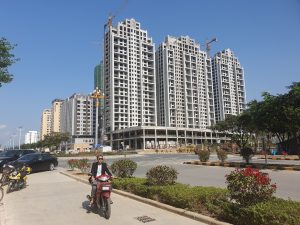Laos’s government has again bestowed a national award on the head of a special economic zone in the country’s northwest which has been linked to a host of criminal activities, including online scamming operations.
Zhao Wei, the Chinese founder of the Hong Kong-registered Kings Romans Group, was presented with the Third-Class Development Medal in a ceremony inside his Golden Triangle Special Economic Zone (GTSEZ) on December 6, the Laotian Times reported. Presenting the award was Viengsavath Siphandone, the governor of Luang Namtha province, who praised Zhao’s provision of around 1.3 billion Lao kip (around $59,400) to the Luang Namtha Provincial Police Command.
According to a Chinese media report, itself a carbon copy of a Lao-language report by a provincial news service, Viengsavath, a former minister of public works and transport, “expressed sincere gratitude for the crucial contributions” that Zhao has made “to the economic and social development of Laos over the years.”
As chairman of Kings Romans Group, Zhao has been responsible for the development of the GTSEZ, a palm-fringed Disneyland located on the Mekong River in Bokeo province, at the point where the borders of Laos, Myanmar, and Thailand converge.
Since 2007, when the Lao government granted Zhao a 99-year lease over the GTSEZ, the site has grown into a cornucopia of hotels, casinos, and high-rise apartment buildings that looms over the sleepy Thai village of Sop Ruak on the opposite bank of the Mekong. Under the de facto sovereignty of Zhao’s Kings Romans Group, the GTSEZ initially focused on attracting visitors from China, where gambling is banned outside of Macau. But the GTSEZ has since become involved in all manner of illicit, semi-legal, and criminal activities, some of which I observed first-hand during a visit to the zone in 2016.
In 2018, Zhao was sanctioned by the U.S. government for his involvement in “drug trafficking, human trafficking, money laundering, bribery, and wildlife trafficking.” In a January photo essay, the International Crisis Group described Zhao as a “Chinese crime boss” who presides over a “city-scale development being built around barely concealed criminality.”
There is also ample evidence that the GTSEZ has functioned as an important node of the titanic online scamming operations that have proliferated in mainland Southeast Asia since the end of the COVID-19 pandemic. The past three years have brought a stream of reports about foreign nationals being rescued from the GTSEZ after being trafficked there on false promises of legitimate work.
In a May report, the United States Institute of Peace estimated that there were 74,000 Myanmar and Chinese nationals living within the GTSEZ, arguing that “it is highly probable that the majority of them are working in either scamming operations or casinos.” It said that this also did not include the “thousands of nationals from other countries also held in the GTSEZ,” and put the total number of scam workers in the country at 85,000. It described this as a “conservative” estimate.
This is not the first time that Zhao has been garlanded by the Lao government. In October 2022, right as the first detailed reports of forced scamming operations within his zone were coming to light, he was granted the Medal of Bravery (Second Class) for “his efforts and contribution to national defense and national public security in the Golden Triangle Special Economic Zone.” Lao state media continues to extoll the economic progress within the zone and to treat Zhao as a business figure of probity.
Many recent reports have highlighted Zhao’s cooperation in rooting out criminal activities from within the zone. In August, after a meeting with Zhao, the Lao government announced a crackdown on online scamming operations in the GTSEZ, ordering all fraud centers to be “completely shut down by August 25.” Lao and Chinese security forces quickly detained 771 people running scams within the zone, and more arrests have since followed.
Whether and to what extent this crackdown has since succeeded in wiping out scamming from the GTSEZ remains unclear. David Hutt, a columnist for The Diplomat, wrote an article for Radio Free Asia last month that seemed to suggest that the crackdown had been undertaken in earnest, and has made some progress since August. The article cited a number of factors – including the concentration of the country’s “scam sector” in the GTSEZ and the fact that most scamming profits flowed out of the country rather than corrupting and co-opting national-level elites – that could explain why the crackdown could be more successful than the limp actions taken by Cambodia’s government. The crackdown also evidently enjoys strong backing from China, Vientiane’s primary patron.
Nevertheless, the Lao government’s decision to grant another award to Zhao is telling. It suggests that he continues to enjoy de facto autonomy within the GTSEZ, and that there are limits to how willing or able it is to curb his power. Even if scam operations are shut down within the zone (and there is good reason to think they will simply move elsewhere in Laos or the region), a structure remains in place that almost guarantees that the GTSEZ will remain a haven for criminal activities of various kinds.

































